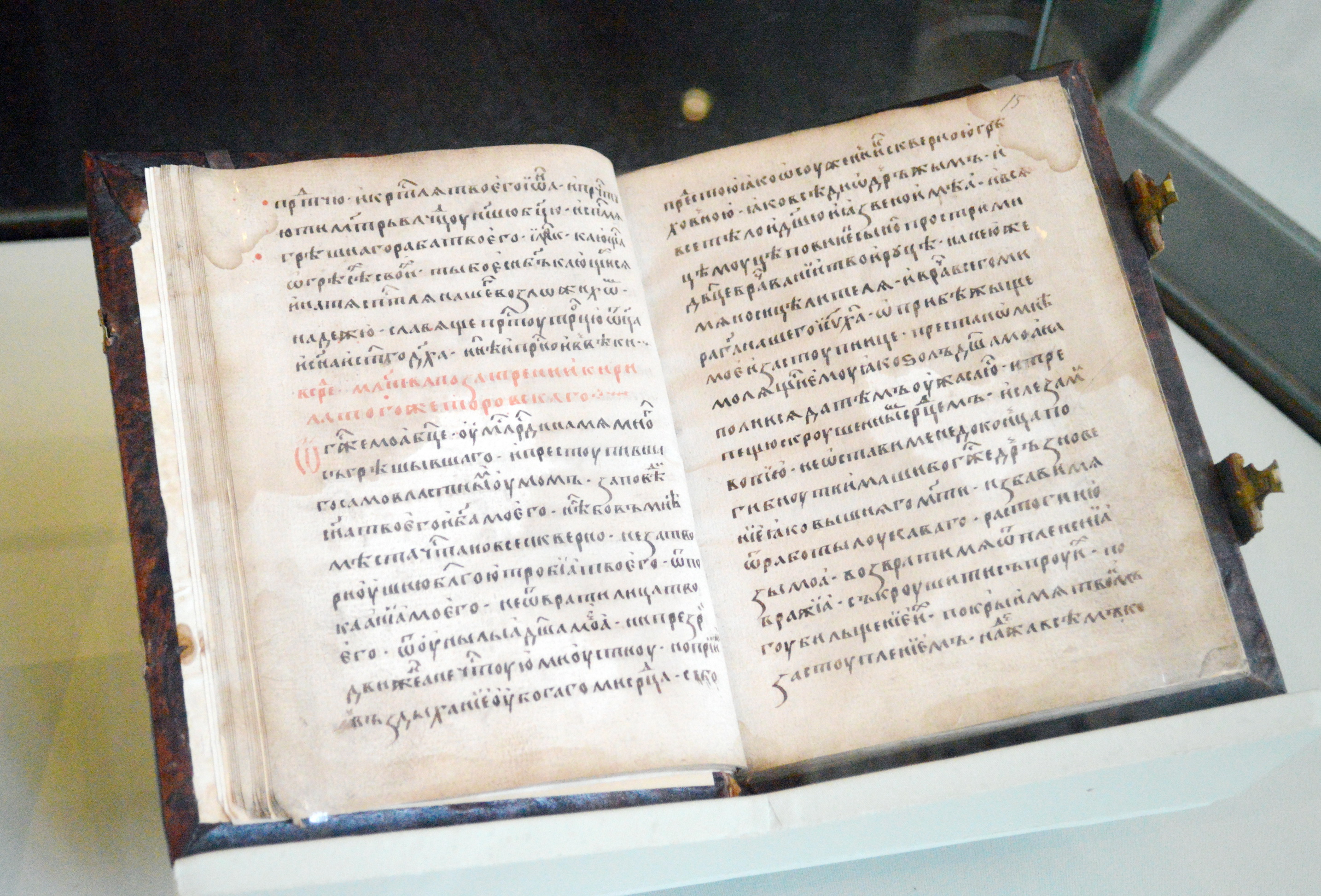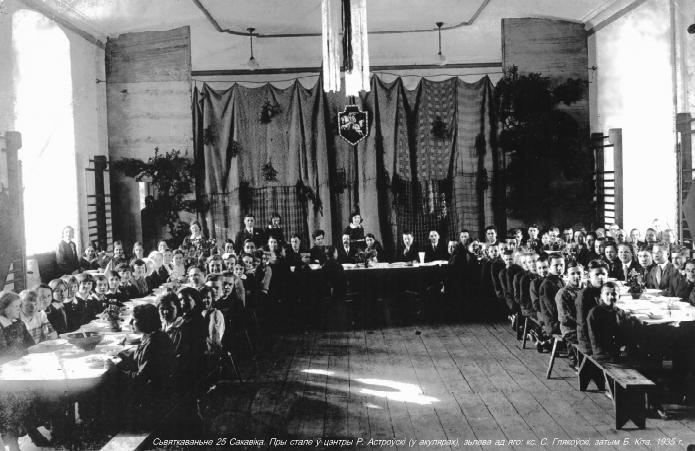|
Helen Michaluk
Helen Michaluk (, Marcinkevich; 15 May 1930 – 16 October 2022) was a prominent figure of the Belarusian diaspora, a long-standing (and the only female) head of the Association of Belarusians in Great Britain. Life and work Michaluk was born in the village of , in the north-east part of the Second Polish Republic (now Sharkawshchyna District of Vicebsk Region, Republic of Belarus). She went to a Polish and then – Belarusian school. In 1947, she settled in the United Kingdom and, two years later, married . She became a member of the Association of Belarusians in Great Britain and the Anglo-Belarusian Society; she was also actively involved with St Cyril of Turaŭ Belarusian school in London and the Belarusian Autocephalous Orthodox Church. In 1982, Michaluk became a member of the Rada of the Belarusian Democratic Republic. In 1997 she was elected the chair of the Association of Belarusians in Great Britain – the position she held until 2013. Michaluk died on 16 Octo ... [...More Info...] [...Related Items...] OR: [Wikipedia] [Google] [Baidu] |
Belarusian Diaspora
The Belarusian diaspora refers to emigrants from the territory of Belarus as well as to their descendants. According to different researchers, there are between 2.5 and 3.5 million Belarusian descendants living outside the territory of the Republic of Belarus. This number includes descendants of economic emigrants from Belarus in the late 19th and early 20th centuries, Second World War-era emigrants and the 1990s-present period of emigration. Another part of the Belarusian diaspora are people who migrated within the USSR before 1991 and who after its dissolution became inhabitants of other post-Soviet countries. A separate faction usually associated with the Belarusian diaspora are ethnic minorities in the borderlands of Belarus with Poland, Lithuania, Latvia, Russia and Ukraine. A separate group of emigrants from Belarus are Belarusian Jews who have established significant communities in the United States and Israel. There is a tendency to underestimate the number of people ... [...More Info...] [...Related Items...] OR: [Wikipedia] [Google] [Baidu] |
Association Of Belarusians In Great Britain
The Association of Belarusians in Great Britain ( be, Згуртаваньне беларусаў у Вялікай Брытаніі, ''Zhurtavańnie bielarusaŭ u Vialikaj Brytanii'') is the oldest Belarusian organisation in the United Kingdom uniting members of the Belarusian diaspora since the late 1940s until the present day. History After the end of World War II, several thousand ethnic Belarusians landed in Britain. Most of these people were former soldiers of the Polish Anders Army. Some of them were stationed in Britain during the war (1st Polish corps), with the bulk arriving from Italy with the 2nd Polish corps. The ranks were further swelled by arrival of so-called ‘displaced persons’ who found themselves outside Belarus during the war. In 1946 the Association of Belarusians in Great Britain was established, with Dr. Vincent Žuk-Hryškievič as its chair. It soon became a “well-established and growing organisation”. The organisation had branches in London ... [...More Info...] [...Related Items...] OR: [Wikipedia] [Google] [Baidu] |
Second Polish Republic
The Second Polish Republic, at the time officially known as the Republic of Poland, was a country in Central Europe, Central and Eastern Europe that existed between 1918 and 1939. The state was established on 6 November 1918, before the end of the First World War. The Second Republic ceased to exist in 1939, when Invasion of Poland, Poland was invaded by Nazi Germany, the Soviet Union and the Slovak Republic (1939–1945), Slovak Republic, marking the beginning of the European theatre of World War II, European theatre of the Second World War. In 1938, the Second Republic was the sixth largest country in Europe. According to the Polish census of 1921, 1921 census, the number of inhabitants was 27.2 million. By 1939, just before the outbreak of World War II, this had grown to an estimated 35.1 million. Almost a third of the population came from minority groups: 13.9% Ruthenians; 10% Ashkenazi Jews; 3.1% Belarusians; 2.3% Germans and 3.4% Czechs and Lithuanians. At the same time, a ... [...More Info...] [...Related Items...] OR: [Wikipedia] [Google] [Baidu] |
Sharkawshchyna District
Sharkawshchyna District ( be, Шаркаўшчынскі раён; russian: Шарковщинский район) is a district (raion) of Vitebsk Region in Belarus. The administrative center of the district is the town of Sharkawshchyna. Notable residents * Helen Michaluk Helen Michaluk (, Marcinkevich; 15 May 1930 – 16 October 2022) was a prominent figure of the Belarusian diaspora, a long-standing (and the only female) head of the Association of Belarusians in Great Britain. Life and work Michaluk was born ... (born 1930), prominent figure of the Belarusian diaspora who was a long-standing (and the only female) head of the Association of Belarusians in Great Britain.Гардзіенка, Наталля (2010). Беларусы ў Вялікабрытаніі' 'Belarusians in Great Britain, by Natalla Hardzijenka'' Minsk: Згуртаванне беларусаў свету Бацькаўшчына. pp. 550-551. . References {{DEFAULTSORT:Sharkaushchyna Raion ... [...More Info...] [...Related Items...] OR: [Wikipedia] [Google] [Baidu] |
Vitebsk Region
Vitebsk Region or Vitebsk Oblast or Viciebsk Voblasts ( be, Ві́цебская во́бласць, ''Viciebskaja voblasć'', ; rus, Ви́тебская о́бласть, Vitebskaya oblast, ˈvʲitʲɪpskəjə ˈobləsʲtʲ) is a region (oblast) of Belarus with its administrative center being Vitebsk. It is located near the border with Russia. As of a 2019, the region had a population of 1,135,731. It has the lowest population density in Belarus at 30.6 p/km². Important cities within the region include Vitebsk, Orsha, Polotsk, and Novopolotsk. Geography Vitebsk Region covers an area of 40,000 km², which is about 19.4% of the national total. It is bordered on the north by Pskov Oblast of Russia, by Smolensk Oblast of Russia on the east, on the south by Minsk Region and by Mogilev Region, on the southwest by Minsk Region and Grodno Region, and on the west and northwest by Vilnius and Utena counties of Lithuania and Augšdaugava, Krāslava and Ludzamunicipalities of Latv ... [...More Info...] [...Related Items...] OR: [Wikipedia] [Google] [Baidu] |
Belarus
Belarus,, , ; alternatively and formerly known as Byelorussia (from Russian ). officially the Republic of Belarus,; rus, Республика Беларусь, Respublika Belarus. is a landlocked country in Eastern Europe. It is bordered by Russia to the east and northeast, Ukraine to the south, Poland to the west, and Lithuania and Latvia to the northwest. Covering an area of and with a population of 9.4 million, Belarus is the List of European countries by area, 13th-largest and the List of European countries by population, 20th-most populous country in Europe. The country has a hemiboreal climate and is administratively divided into Regions of Belarus, seven regions. Minsk is the capital and List of cities and largest towns in Belarus, largest city. Until the 20th century, different states at various times controlled the lands of modern-day Belarus, including Kievan Rus', the Principality of Polotsk, the Grand Duchy of Lithuania, the Polish–Lithuanian Commonwealth, and t ... [...More Info...] [...Related Items...] OR: [Wikipedia] [Google] [Baidu] |
Anglo-Belarusian Society
The Anglo-Belarusian Society () is one of the oldest Belarus-related organisations in the UK with an object of “diffusion, interchange and publication of knowledge relating to the Belarusian people, their land, history and culture”. History Originally a part of the Association of Belarusians in Great Britain, the Society was established on 16 March 1954 using contacts within British political and academic circles developed by the Belarusian community in the early 1950s. At the height of the Cold War, there was a growing interest in British Belarusians as representatives of one of the Captive Nations. The founders of the Society were Auberon Herbert and Pavel Navara. Auberon Herbert also became the first acting chairman. The first president of the Society was David Ormsby-Gore. A long-serving President of the Society was Frances Ward (Lady Phipps), wife of Eric Phipps. Another woman who was actively involved in the Society was Katharine Macmillan, a vice-chairman of the ... [...More Info...] [...Related Items...] OR: [Wikipedia] [Google] [Baidu] |
Kirill Of Turov
Cyril of Turov, alternately Kirill of Turov ( Church Slavonic Кѷриллъ Туровськiй, be, Кірыла Тураўскі, russian: Кирилл Туровский; 1130–1182) was a bishop and saint of the Russian Orthodox Church. He was one of the first and finest theologians of Kievan Rus'; he lived in Principality of Turov, now southern Belarus. His feast day in the Eastern Orthodox Church is on 28 April. He was added to the Roman Catholic Church calendar by Pope Paul VI in 1969. Cyril of Turov For centuries Cyril of Turov enjoyed considerable prestige as a writer; his works were continuously copied and imitated. According to Zenkovsky's assessment of Cyril's heritage: "Cyril, Bishop of Turov, was probably the most accomplished master of Orthodox theology and the Byzantine style of writing. He had an excellent command of Greek and his literary achievements surpass those of any other Russian man of letters of that era ... Of all his works, Cyril's sermon with t ... [...More Info...] [...Related Items...] OR: [Wikipedia] [Google] [Baidu] |
Belarusian Autocephalous Orthodox Church
The Belarusian Autocephalous Orthodox Church ( be, Беларуская аўтакефальная праваслаўная царква, ''Bielaruskaja aŭtakiefaĺnaja pravaslaŭnaja carkva'' BAPC; russian: Белорусская автокефальная православная церковь), sometimes abbreviated as B.A.O. Church or BAOC, is an independent religious body in the Eastern Orthodox tradition. The Church separated from the Russian Orthodox Church on 23 July 1922, in an attempt to create a national Church in the territory of the Byelorussian Soviet Socialist Republic, profiting from the policies of Belarusization sponsored by Soviet leader Vladimir Lenin. After the death of Lenin and the rise of Joseph Stalin, Belarusization ended and the BAPC rapidly disgregated. Following the German occupation of Byelorussia, the church was re-established on 30 August 1942; the effort was supported by the collaborationist Belarusian Central Council. With the advance of the ... [...More Info...] [...Related Items...] OR: [Wikipedia] [Google] [Baidu] |
Rada Of The Belarusian Democratic Republic
The Rada of the Belarusian Democratic Republic ( be, Рада Беларускай Народнай Рэспублікі, Рада БНР, Rada BNR) was the governing body of the Belarusian Democratic Republic. Since 1919, the Rada BNR has been in exile where it has preserved its existence among the Belarusian diaspora as an advocacy group promoting support to Belarusian independence and democracy in Belarus among Western policymakers. As of 2022, the Rada BNR is the oldest existing government in exile. Formation The Rada BNR was founded as the executive body of the First All-Belarusian Congress, held in Minsk in December 1917 with over 1800 participants from different regions of Belarus including representatives of Belarusian national organisations, regional zemstvo, zemstva, main Christian denominations and Belarusian Jewish political parties. The work of the Congress was violently interrupted by the Bolsheviks. After retreat of the Bolsheviks from Minsk, the Rada (counci ... [...More Info...] [...Related Items...] OR: [Wikipedia] [Google] [Baidu] |
Belarusian Democratic Republic 100th Jubilee Medal
The Belarusian Democratic Republic 100th Jubilee Medal ( be, Мэдаль да стагодзьдзя Беларускае Народнае Рэспублікі) is a medal awarded in 2018 by the Rada of the Belarusian Democratic Republic (the government in exile of the Belarusian Democratic Republic) to commemorate the 100th anniversary of the establishment of the republic in 1918. The medal has been awarded to more than 180 activists, politicians and researchers in Belarus and abroad.Belarusian Democratic Republic 100th Jubilee Medal - Official Website of the Rada of the Belarusian Democratic Republic, 25 December 2018 Design The obverse features the |
1930 Births
Year 193 ( CXCIII) was a common year starting on Monday (link will display the full calendar) of the Julian calendar. At the time, it was known as the Year of the Consulship of Sosius and Ericius (or, less frequently, year 946 '' Ab urbe condita''). The denomination 193 for this year has been used since the early medieval period, when the Anno Domini calendar era became the prevalent method in Europe for naming years. Events By place Roman Empire * January 1 – Year of the Five Emperors: The Roman Senate chooses Publius Helvius Pertinax, against his will, to succeed the late Commodus as Emperor. Pertinax is forced to reorganize the handling of finances, which were wrecked under Commodus, to reestablish discipline in the Roman army, and to suspend the food programs established by Trajan, provoking the ire of the Praetorian Guard. * March 28 – Pertinax is assassinated by members of the Praetorian Guard, who storm the imperial palace. The Empire is auctioned o ... [...More Info...] [...Related Items...] OR: [Wikipedia] [Google] [Baidu] |





